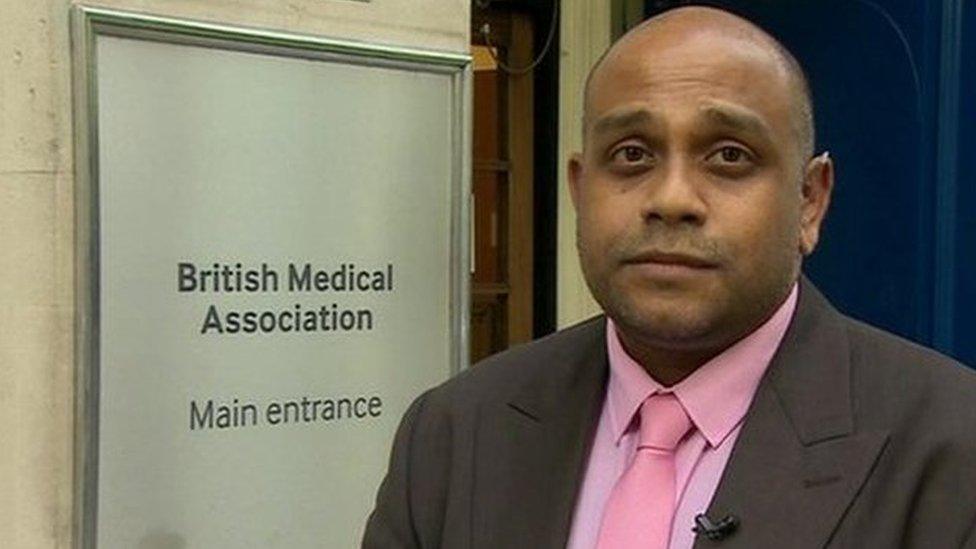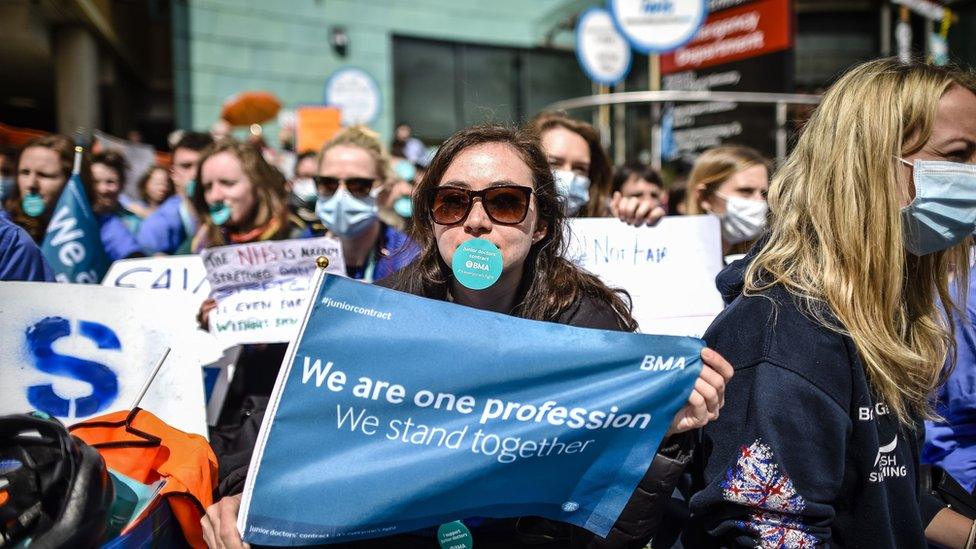Junior doctors: Lifting the veil on dispute's twists
- Published

One day a history of the junior doctors' dispute in England will be written.
The full story of the most acrimonious row between doctors and government in modern times and the first ever walkout affecting all care by medics in the history of the NHS will no doubt be told when the dust has settled.
Early drafts, however, are already being pieced together.
Right now the dispute is not technically over as junior doctor members of the British Medical Association are considering the outline deal on pay and working conditions hammered out with the government.
The revised contract will be published soon and it will be closely scrutinised.
The ballot closes at the end of June with the result due in the first week of July. The result is not a foregone conclusion.
Both sides are keeping their heads down to avoid inflaming the mood as doctors make their decision on the contract.
Leaked messages
But that has not stopped the leak of social media correspondence amongst leading members of the BMA revealing sensitive internal discussions as the row with ministers intensified.
Published in detail in Health Service Journal (HSJ), external, the leaked exchanges with more than 1,000 private messages suggest the BMA was considering a hard line strategy which would lead to a prolonged dispute.
Using the social media messaging service What's App, the executive of the BMA junior doctors' committee discussed privately their approach from late last year.
Leaks of the material published in HSJ include comments reportedly from Dr Johann Malawana, chairman of the junior doctors' committee, including the idea of using IA (industrial action) as "a genuine tool once again… in a series of negotiations that are interspersed with IA".
Dr Malawana's remarks refer to a plan for "five weeks of headlines about juniors strikes through January and February" and "a strategy that tied the DH ( Department of Health) up in knots for the next 16-18 months".
He made clear that this was not formal BMA policy, but the exchanges suggest it echoed the thinking of the committee executive.

Leaks of the material published in HSJ include comments reportedly from Dr Johann Malawana
On another occasion he says: "The best solution may actually [be] to draw this right out. Into the Europe debate and leadership debate. Punctuated IA for a prolonged period and force them to impose against our support."
These private exchanges appear to be at odds with the BMA's publicly stated position at the time of being willing to continue talks in search of a solution and urging the government to stay at the negotiating table.
The idea of "forcing" ministers to impose the contract will certainly raise eyebrows at Westminster among those who have criticised the BMA for organising the series of strikes which lead to tens of thousands of postponed operations.
HSJ has not published every private message it obtained, so it's not possible to get a full flavour of the range of opinion across the junior doctors' committee.
'Anger and frustration'
But the BMA has not denied that the exchanges are genuine.
A spokesperson said: "These conversations go back over six months and reflect the anger and frustration felt by junior doctors across the country due to the government's refusal to listen to their concerns.
"Private discussions should not be mistaken for the agreed strategy of the BMA junior doctors' committee, which was communicated publicly."
The statement goes on to argue that what really matters was not what happened in private a few months ago, but the fact that a negotiated settlement was eventually reached.
We may never know the source of the leak.

The revised junior doctors' contract will be published soon
The string of messages could have been passed to HSJ with the tacit blessing of the junior doctors' committee to show they were prepared to stand up to the government and fight for as long as it took to get an acceptable settlement.
There have been mutterings in some quarters that the leadership compromised too much to reach the final deal.
The story is not finished.
The final page could come with the junior doctor ballot result in July.
But that has not prevented more detail being added to earlier chapters in this intriguing tale.
- Published7 April 2016
- Published6 April 2016
